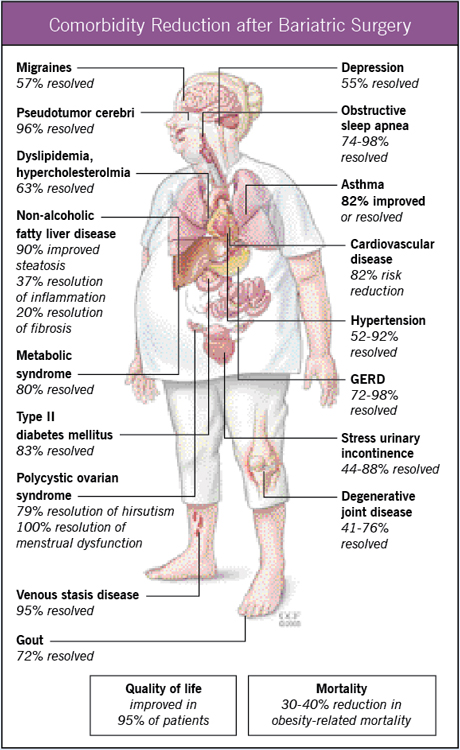Overview
If you're significantly overweight and want to make a lifestyle change, you may be a candidate for bariatric surgery at Cleveland Clinic.
Our expert team of surgeons, physicians, anesthesiologists, psychologists, counselors, dietitians and specialized nurses focuses on your long-term weight loss success. Together with specialists in sleep disorders, gastroenterology, nutrition, cardiology, internal medicine and other obesity-related fields, as needed, we provide you with the support you need to permanently regain your health.
Each patient in our surgery program is also assigned a patient navigator, who serve as a single point of contact throughout your weight loss surgery journey, offering encouragement and support every step of the way.
At Cleveland Clinic's Bariatric and Metabolic Institute, our team will perform a thorough physical exam, which may require blood work and other diagnostic tests, to help create a weight loss plan that’s right for you.
Surgical Weight Loss

Surgical weight management is typically designed for those 100 pounds or more overweight. You may also qualify with a BMI of 35 to 40 if you have another serious illnesses, such as diabetes, cardiovascular disease, hypertension or sleep apnea.
We also manage patients postoperatively to ensure adequate weight loss, adjusting medications when associated illnesses begin to improve and to prevent nutritional deficiencies.
Surgical Procedures Offered
Roux-en-Y gastric bypass - Surgically creates a small stomach pouch, bypassing the lower stomach so less food can be consumed.
Sleeve gastrectomy - Reduces stomach capacity by stapling the stomach and removing two-thirds of the outer portion.
Surgical outcomes
Six months after surgery, patients often find they no longer need medication or treatment for diabetes, high blood pressure, obstructive sleep apnea and a host of other conditions. Cleveland Clinic’s STAMPEDE (Surgical Treatment And Medications may Potentially Eradicate Diabetes Efficiently) study shows bariatric surgery is a highly effective and durable treatment for type 2 diabetes in obese patients, enabling nearly all surgical patients to be free of insulin and many to be free of all diabetic medications three years after surgery.
Medical Weight Loss
For patients who choose not to undergo surgery, or for those who are not eligible, we offer medical management options.
Dietitians review each patient’s food and exercise history and psychologists address issues such as depression, eating disorders and smoking and other addictions. Exercise physiologists also can create individualized exercise programs, including stress testing. Medication, such as appetite suppressants, can be prescribed to help with weight loss.
Patients who are 100 lbs or more overweight are generally referred for surgical weight management. Our team continues to be involved in the surgical part of the process by assisting patients with weight loss prior to surgery. They also manage patients post-operatively to ensure adequate weight loss, perform medication adjustments when associated illnesses begin to improve, and prevent nutritional deficiencies or other complications which could occur without frequent follow-up appointments.
Support Programs
Many behaviors, habits, thoughts and emotions can affect your weight loss. We offer ongoing support groups and classes that address preparing for surgery, binge eating, reducing the risk of substance abuse, life after surgery and other issues.
Take the First Step
If you’re interested in weight loss surgery or medical management, register today for our free informational seminar. You’ll meet key members of our team, learn about what to expect and available treatment options, as well as receive answers to common questions.
Have questions?
Call Cleveland Clinic’s Bariatric and Metabolic Institute at 216.445.2224 or 800.339.9829.
Why Choose Us?
- Skilled, experienced surgeons who have performed thousands of bariatric surgical procedures and handle complex cases (people with certain liver problems or previous abdominal surgery, adolescents and reoperations)
- More than 95 percent of surgeries are performed using minimally invasive (laparoscopic) techniques
- High success rates, low complication and mortality rates
- Dedicated patient navigators, who serve as a single point of contact throughout your weight loss journey, offering encouragement and support every step of the way
- Extensive surgical, nonsurgical and medical treatment options
- Thorough preparation and follow-up programs to help you succeed
- Comfortable, leading-edge facilities designed specifically for the care of bariatric patients
- Convenient locations for weight loss treatment close to home
Resources
Stay Connected
- Explore our convenient locations and learn more about virtual visits
- Meet our team of patient navigators, who will help guide you through your weight loss journey
- Subscribe to Health Essentials e-News for expert insights on nutrition, health and wellness. Get free guides to common conditions, too
- For more information on bariatric surgery, listen to our Butts & Guts podcast featuring John Rodriguez, MD
- Find a wealth of family health & wellness tips
- YouTube